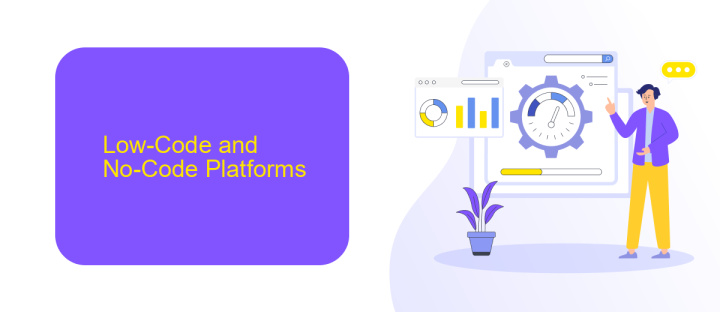Low-Code No-Code Vendors
In today's rapidly evolving tech landscape, Low-Code No-Code (LCNC) platforms are revolutionizing the way businesses develop software. By enabling users to create applications with minimal coding knowledge, these tools are democratizing software development and accelerating digital transformation. This article explores the leading LCNC vendors, highlighting their unique features, benefits, and the impact they have on various industries.
Market Overview
The Low-Code No-Code (LCNC) market is rapidly expanding, driven by the increasing demand for faster and more efficient application development solutions. These platforms enable businesses to create applications with minimal coding, significantly reducing the time and resources required for development.
- Accelerated Development: LCNC platforms allow for quicker application deployment.
- Cost Efficiency: Reduced need for extensive coding expertise lowers development costs.
- Accessibility: Enables non-technical users to participate in the development process.
- Scalability: Easily scalable solutions to meet growing business needs.
One notable player in this market is ApiX-Drive, a service that simplifies the integration of various applications and services. By providing a user-friendly interface and robust automation capabilities, ApiX-Drive enhances the functionality of LCNC platforms, allowing businesses to seamlessly connect different tools and streamline their workflows. As the LCNC market continues to grow, the role of such integrative services will become increasingly vital.
Low-Code and No-Code Platforms

Low-code and no-code platforms are revolutionizing the way businesses develop and deploy applications. These platforms empower users with minimal or no programming knowledge to create functional and robust applications through intuitive drag-and-drop interfaces and pre-built templates. This democratization of application development not only accelerates the development process but also reduces costs and reliance on specialized IT personnel, enabling faster time-to-market for digital solutions.
Moreover, integrating various services and automating workflows have become seamless with tools like ApiX-Drive. ApiX-Drive facilitates easy integration between different applications and services without requiring extensive coding skills. By providing a user-friendly interface and a wide range of pre-configured connectors, it allows businesses to streamline their operations and enhance productivity. Thus, low-code and no-code platforms, combined with integration services like ApiX-Drive, offer a comprehensive solution for modern business needs, fostering innovation and efficiency across industries.
Benefits and Challenges

Low-code and no-code platforms offer numerous benefits, making them an attractive choice for businesses of all sizes. These platforms significantly reduce the time and cost associated with software development, allowing non-technical users to create applications quickly. They also enable rapid prototyping and iterative development, which can lead to faster innovation and improved business agility.
- Reduced development time and cost
- Empowerment of non-technical users
- Rapid prototyping and iterative development
- Improved business agility
- Seamless integration with existing systems
However, these platforms also come with challenges. Customization options can be limited, potentially restricting the functionality of the developed applications. There might also be concerns regarding scalability and performance for complex projects. Additionally, integrating these platforms with existing systems can sometimes be complicated. Tools like ApiX-Drive can help streamline these integrations, making it easier to connect various applications and services seamlessly. Overall, while low-code and no-code platforms offer significant advantages, it is essential to consider these challenges to ensure successful implementation.
Key Players and Case Studies

In the rapidly evolving landscape of Low-Code No-Code platforms, several key players have emerged, driving innovation and adoption across various industries. These vendors offer a diverse range of tools that enable organizations to develop applications with minimal coding, thereby accelerating digital transformation.
Among the prominent vendors are OutSystems, Mendix, and Microsoft Power Apps. These platforms are designed to cater to a wide array of business needs, from simple automation tasks to complex enterprise-level applications.
- OutSystems: Known for its robust capabilities in enterprise-grade application development.
- Mendix: Offers a comprehensive platform for rapid application development and deployment.
- Microsoft Power Apps: Integrates seamlessly with other Microsoft services, making it ideal for businesses already within the Microsoft ecosystem.
Case studies highlight the effectiveness of these platforms. For instance, a healthcare provider used Mendix to create a patient management system in weeks rather than months. Similarly, ApiX-Drive has facilitated seamless integrations, enabling businesses to automate workflows without extensive coding, thereby enhancing operational efficiency.
- Automate the work of an online store or landing
- Empower through integration
- Don't spend money on programmers and integrators
- Save time by automating routine tasks
Future Trends
The future of Low-Code No-Code (LCNC) platforms is poised for significant evolution, driven by advancements in artificial intelligence and machine learning. These technologies will enable more intuitive and intelligent development environments, allowing users to create complex applications with minimal manual coding. Additionally, the integration capabilities of LCNC platforms are expected to expand, making it easier for businesses to connect disparate systems and streamline workflows. Services like ApiX-Drive, which facilitate seamless integration between various applications, will become increasingly vital in this ecosystem.
Moreover, the democratization of software development will continue to accelerate, empowering non-technical users to take on roles traditionally reserved for developers. This shift will not only increase productivity but also foster innovation by enabling a broader range of individuals to contribute to digital transformation initiatives. As a result, businesses will be able to respond more swiftly to market changes and customer needs, leveraging the flexibility and scalability of LCNC platforms to stay competitive. The future trends in LCNC are set to redefine the landscape of software development, making it more accessible, efficient, and integrated.
FAQ
What is Low-Code/No-Code development?
Who can benefit from using Low-Code/No-Code platforms?
How secure are Low-Code/No-Code platforms?
Can Low-Code/No-Code platforms integrate with existing systems?
What are some common use cases for Low-Code/No-Code platforms?
Apix-Drive will help optimize business processes, save you from a lot of routine tasks and unnecessary costs for automation, attracting additional specialists. Try setting up a free test connection with ApiX-Drive and see for yourself. Now you have to think about where to invest the freed time and money!


